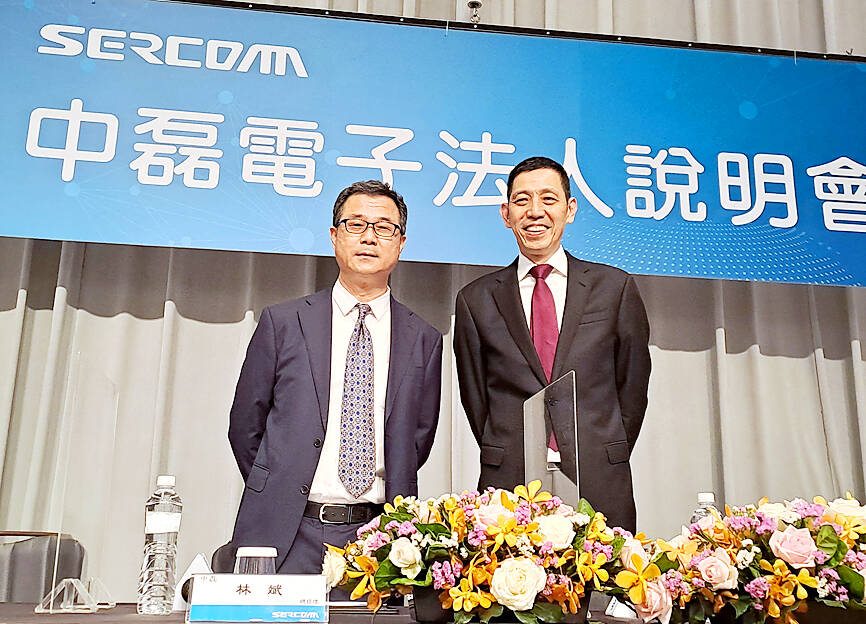Sercomm Corp (中磊) saw its shares rally 1.97 percent yesterday after the broadband equipment supplier gave an upbeat business outlook for next year, expecting robust demand for Internet-connected devices from 5G and Wi-Fi-related devices to fiber-optic products to drive revenue growth.
The Taipei-based company is one of only a few among local electronics firms that expects growth in the post-COVD-19 era, as Internet connection has become indispensable despite the world economy facing greater downside risks due to surging inflation and intensifying geopolitical tensions.
The stock price of Sercomm surged 1.97 percent to the highest level in more than one month at NT$82.7, outperforming the TAIEX, which edged lower 0.04 percent yesterday.

Photo: CNA
“We are looking at healthy and stable growth next year,” company president Ben Lin (林斌) told reporters on Thursday. “Although the overall market demand is in decline, we have developed the right products catering to customers’ demand from certain growing segments.”
The constant technology migration to higher-speed Internet connections through 5G and Wi-Fi-6 technology offers growth opportunities, Sercomm said.
The world’s major economies are injecting massive funds into infrastructure construction including fiber-optic networks to stimulate the economy, which would provide a boon to Sercomm, the company said.
Aside from existing product lines, Sercomm expects to see rapid growth in new demand for television set-top boxes from telecom operators. Sercomm generates about 80 percent of its revenue from supplying broadband devices to telecom operators around the world.
Sercomm has a long order visibility for the next 12 months, but the company is cautiously handling customers’ orders and building chip inventory, as mounting uncertainty about external factors — geopolitical conflict in particular — could cripple demand.
Telecom operators from the EU have axed orders since the second and third quarters, as the economic block has been severely hit by soaring inflation and high energy prices.
However, consistent growth from other areas such as India and Japan have helped offset the losses, Sercomm chairman James Wang (王煒) told reporters on Thursday.
To minimize any impact from geopolitical conflicts, Sercomm has diversified its manufacturing site to the Philippines and is developing a new manufacturing facility in India, the company said.
By next year, the Philippine factory capacity would surpass the company’s factory in China, Wang said.

UNCERTAINTY: Innolux activated a stringent supply chain management mechanism, as it did during the COVID-19 pandemic, to ensure optimal inventory levels for customers Flat-panel display makers AUO Corp (友達) and Innolux Corp (群創) yesterday said that about 12 to 20 percent of their display business is at risk of potential US tariffs and that they would relocate production or shipment destinations to mitigate the levies’ effects. US tariffs would have a direct impact of US$200 million on AUO’s revenue, company chairman Paul Peng (彭雙浪) told reporters on the sidelines of the Touch Taiwan trade show in Taipei yesterday. That would make up about 12 percent of the company’s overall revenue. To cope with the tariff uncertainty, AUO plans to allocate its production to manufacturing facilities in

TAKING STOCK: A Taiwanese cookware firm in Vietnam urged customers to assess inventory or place orders early so shipments can reach the US while tariffs are paused Taiwanese businesses in Vietnam are exploring alternatives after the White House imposed a 46 percent import duty on Vietnamese goods, following US President Donald Trump’s announcement of “reciprocal” tariffs on the US’ trading partners. Lo Shih-liang (羅世良), chairman of Brico Industry Co (裕茂工業), a Taiwanese company that manufactures cast iron cookware and stove components in Vietnam, said that more than 40 percent of his business was tied to the US market, describing the constant US policy shifts as an emotional roller coaster. “I work during the day and stay up all night watching the news. I’ve been following US news until 3am

COLLABORATION: Given Taiwan’s key position in global supply chains, the US firm is discussing strategies with local partners and clients to deal with global uncertainties Advanced Micro Devices Inc (AMD) yesterday said it is meeting with local ecosystem partners, including Taiwan Semiconductor Manufacturing Co (TSMC, 台積電), to discuss strategies, including long-term manufacturing, to navigate uncertainties such as US tariffs, as Taiwan occupies an important position in global supply chains. AMD chief executive officer Lisa Su (蘇姿丰) told reporters that Taiwan is an important part of the chip designer’s ecosystem and she is discussing with partners and customers in Taiwan to forge strong collaborations on different areas during this critical period. AMD has just become the first artificial-intelligence (AI) server chip customer of TSMC to utilize its advanced

Six years ago, LVMH’s billionaire CEO Bernard Arnault and US President Donald Trump cut the blue ribbon on a factory in rural Texas that would make designer handbags for Louis Vuitton, one of the world’s best-known luxury brands. However, since the high-profile opening, the factory has faced a host of problems limiting production, 11 former Louis Vuitton employees said. The site has consistently ranked among the worst-performing for Louis Vuitton globally, “significantly” underperforming other facilities, said three former Louis Vuitton workers and a senior industry source, who cited internal rankings shared with staff. The plant’s problems — which have not